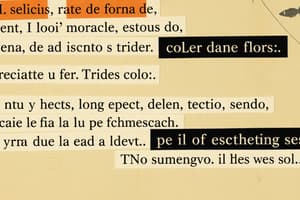Podcast
Questions and Answers
What is the correct negative tú command for the verb "buscar"?
What is the correct negative tú command for the verb "buscar"?
- No busque
- No buscas
- No busca
- No busques (correct)
Which of the following verbs has an irregular negative "tú" command?
Which of the following verbs has an irregular negative "tú" command?
- Escribir
- Dar (correct)
- Comer
- Hablar
What is the correct affirmative Ud. command for the verb "leer"?
What is the correct affirmative Ud. command for the verb "leer"?
- Lea (correct)
- Lee
- Lees
- Leen
Which of the following is an irregular affirmative "tú" command?
Which of the following is an irregular affirmative "tú" command?
What is the correct negative Uds. command for the verb "dormir"?
What is the correct negative Uds. command for the verb "dormir"?
What is the correct subjunctive form of the verb 'hablar' for 'yo'?
What is the correct subjunctive form of the verb 'hablar' for 'yo'?
Which spelling change applies to the verb 'buscar' in the subjunctive?
Which spelling change applies to the verb 'buscar' in the subjunctive?
Which of the following is an irregular subjunctive form?
Which of the following is an irregular subjunctive form?
What is the correct subjunctive form of 'ir' for 'ustedes'?
What is the correct subjunctive form of 'ir' for 'ustedes'?
Identify the correct conjugation of 'tener' in the subjunctive for 'él'.
Identify the correct conjugation of 'tener' in the subjunctive for 'él'.
Flashcards
Subjunctive Mood
Subjunctive Mood
A verb form used to express wishes, doubt, or hypothetical situations.
Formation of -ar Subjunctive
Formation of -ar Subjunctive
For -ar verbs, drop -o from 'yo' form, add -e, -es, -e, -emos, -éis, -en.
Formation of -er/-ir Subjunctive
Formation of -er/-ir Subjunctive
For -er/-ir verbs, drop -o from 'yo' form, add -a, -as, -a, -amos, -áis, -an.
Irregular Subjunctive: Dar
Irregular Subjunctive: Dar
Signup and view all the flashcards
-car, -gar, -zar Changes
-car, -gar, -zar Changes
Signup and view all the flashcards
Affirmative Tú Commands Rule
Affirmative Tú Commands Rule
Signup and view all the flashcards
Irregular Affirmative Tú Commands
Irregular Affirmative Tú Commands
Signup and view all the flashcards
Negative Tú Commands Rule
Negative Tú Commands Rule
Signup and view all the flashcards
Irregular Negative Tú Commands
Irregular Negative Tú Commands
Signup and view all the flashcards
Ud./Uds. Commands Rule
Ud./Uds. Commands Rule
Signup and view all the flashcards
Study Notes
Affirmative Tú Commands
- Use the third-person singular (él/ella/Ud.) present indicative form of the verb.
- Example: Hablar → habla; Comer → come; Escribir → escribe.
- Irregular forms:
- Decir → Di
- Hacer → Haz
- Ir → Ve
- Poner → Pon
- Salir → Sal
- Ser → Sé
- Tener → Ten
- Venir → Ven
Negative Tú Commands
- Use the yo form of the present indicative, removing the -o and adding:
- -ar verbs: -es (e.g., hablar → no hables)
- -er/-ir verbs: -as (e.g., comer → no comas, escribir → no escribas)
- Irregular forms:
- Dar → No des
- Estar → No estés
- Ir → No vayas
- Ser → No seas
- Saber → No sepas
- Verbs ending in -car, -gar, -zar change spelling (e.g., buscar → no busques; llegar → no llegues; empezar → no empieces)
Affirmative and Negative Commands (Ud./Uds.)
- Use the yo form of the present indicative, removing the -o and adding:
- -ar verbs: -e (Ud.), -en (Uds.)
- -er/-ir verbs: -a (Ud.), -an (Uds.)
- Example: Hablar → Hable (Ud.), Hablen (Uds.); Comer → Coma (Ud.), Coman (Uds.); Escribir → Escriba (Ud.), Escriban (Uds.)
- Irregular Commands (Ud./Uds):
- Same as negative tú commands (Dar, Estar, Ir, Ser, Saber, verbs ending in -car, -gar, -zar)
Subjunctive Mood
- Use the yo form of the present indicative, dropping the -o and adding:
- -ar verbs: -e, -es, -e, -emos, -éis, -en
- -er/-ir verbs: -a, -as, -a, -amos, -áis, -an
- Example: Hablar → hable, hables, hable, hablemos, habléis, hablen; Comer → coma, comas, coma, comamos, comáis, coman; Escribir → escriba, escribas, escriba, escribamos, escribáis, escriban
- Irregular Subjunctive Forms:
- Irregular verbs (Dar, Estar, Ir, Saber, Ser, verbs ending in -car, -gar, -zar) have specific subjunctive forms.
Studying That Suits You
Use AI to generate personalized quizzes and flashcards to suit your learning preferences.




